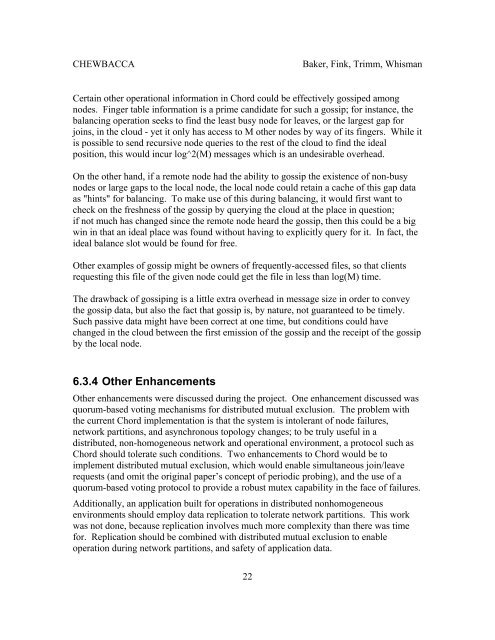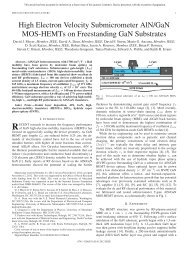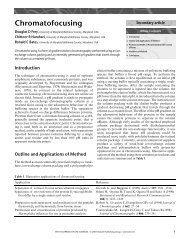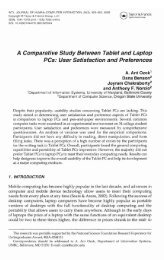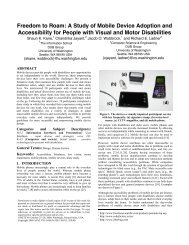Implementing a Distributed Peer to Peer File Sharing System ... - Umbc
Implementing a Distributed Peer to Peer File Sharing System ... - Umbc
Implementing a Distributed Peer to Peer File Sharing System ... - Umbc
Create successful ePaper yourself
Turn your PDF publications into a flip-book with our unique Google optimized e-Paper software.
CHEWBACCA Baker, Fink, Trimm, Whisman<br />
Certain other operational information in Chord could be effectively gossiped among<br />
nodes. Finger table information is a prime candidate for such a gossip; for instance, the<br />
balancing operation seeks <strong>to</strong> find the least busy node for leaves, or the largest gap for<br />
joins, in the cloud - yet it only has access <strong>to</strong> M other nodes by way of its fingers. While it<br />
is possible <strong>to</strong> send recursive node queries <strong>to</strong> the rest of the cloud <strong>to</strong> find the ideal<br />
position, this would incur log^2(M) messages which is an undesirable overhead.<br />
On the other hand, if a remote node had the ability <strong>to</strong> gossip the existence of non-busy<br />
nodes or large gaps <strong>to</strong> the local node, the local node could retain a cache of this gap data<br />
as "hints" for balancing. To make use of this during balancing, it would first want <strong>to</strong><br />
check on the freshness of the gossip by querying the cloud at the place in question;<br />
if not much has changed since the remote node heard the gossip, then this could be a big<br />
win in that an ideal place was found without having <strong>to</strong> explicitly query for it. In fact, the<br />
ideal balance slot would be found for free.<br />
Other examples of gossip might be owners of frequently-accessed files, so that clients<br />
requesting this file of the given node could get the file in less than log(M) time.<br />
The drawback of gossiping is a little extra overhead in message size in order <strong>to</strong> convey<br />
the gossip data, but also the fact that gossip is, by nature, not guaranteed <strong>to</strong> be timely.<br />
Such passive data might have been correct at one time, but conditions could have<br />
changed in the cloud between the first emission of the gossip and the receipt of the gossip<br />
by the local node.<br />
6.3.4 Other Enhancements<br />
Other enhancements were discussed during the project. One enhancement discussed was<br />
quorum-based voting mechanisms for distributed mutual exclusion. The problem with<br />
the current Chord implementation is that the system is in<strong>to</strong>lerant of node failures,<br />
network partitions, and asynchronous <strong>to</strong>pology changes; <strong>to</strong> be truly useful in a<br />
distributed, non-homogeneous network and operational environment, a pro<strong>to</strong>col such as<br />
Chord should <strong>to</strong>lerate such conditions. Two enhancements <strong>to</strong> Chord would be <strong>to</strong><br />
implement distributed mutual exclusion, which would enable simultaneous join/leave<br />
requests (and omit the original paper’s concept of periodic probing), and the use of a<br />
quorum-based voting pro<strong>to</strong>col <strong>to</strong> provide a robust mutex capability in the face of failures.<br />
Additionally, an application built for operations in distributed nonhomogeneous<br />
environments should employ data replication <strong>to</strong> <strong>to</strong>lerate network partitions. This work<br />
was not done, because replication involves much more complexity than there was time<br />
for. Replication should be combined with distributed mutual exclusion <strong>to</strong> enable<br />
operation during network partitions, and safety of application data.<br />
22


